Rebuke to former EPA Administrator Lisa Jackson’s Testimony to Congress
Dissenting Report Exposes Industry Corruption of Science
NJ DEP Science Board & Drinking Water Institute Similarly Corrupted
[Update: 8/15/16 – 8:30 pm– I just received a phone call from a reader advising me that Mr. Hal Bozarth, whom I poke fun at below, recently died. My apologies to Mr. Bozarth’s family and friends. I would NOT have written and posted these photos if I had known he recently died. ~~~ end update]
The US EPA Science Advisory Board (SAB) just issued an important national Report that criticized EPA’s controversial finding that fracking had not caused widespread impacts to drinking water.
EPA’s June 2015 draft Report on fracking concluded [@ ES-6]:
We did not find evidence that these mechanisms have led to widespread, systemic impacts on drinking water resources in the United States
The EPA SAB questioned and criticized that major EPA finding as not supported by data:
The SAB expresses particular concern regarding the draft Assessment Report’s high-level conclusion on page ES-6 that “We did not find evidence that these mechanisms have led to widespread, systemic impacts on drinking water resources in the United States.” The SAB finds that the EPA did not support quantitatively its conclusion about lack of evidence for widespread, systemic impacts of hydraulic fracturing on drinking water resources, and did not clearly describe the system(s) of interest (e.g., groundwater, surface water), the scale of impacts (i.e., local or regional), nor the definitions of “systemic” and “widespread”. The SAB observes that the statement has been interpreted by readers and members of the public in many different ways. The SAB concludes that if the EPA retains this conclusion, the EPA should provide quantitative analysis that supports its conclusion that hydraulic fracturing has not led to widespread, systemic impacts on drinking water resources. Most Panel members also conclude that the statement requires clarification and additional explanation (e.g., consider including possible modifying adjectives before the words “widespread, systemic impact” in the statement on page ES-6). The SAB also concludes that the EPA should carefully consider whether to revise the definition of impact as provided in Appendix J of the draft Assessment Report (e.g., discuss what is meant by “any observed change” in the definition of “impact” in Appendix J). Four of the 30 Panel members find that this statement on page ES-6 is acceptable as written, but note that the EPA should have provided a more robust discussion on how it reached this conclusion. Further details regarding these four Panel members’ opinion are noted in Appendix B to this Report.
Criticizing a scientific conclusion for lack of definition of key terms and lack of supporting data is as harsh as it gets – about as bad as calling the Pope The Devil.
For good news coverage, see this Washington Post story:
I want to make three quick comments on the NJ backstory and that highlight the NJ implications.
1. Like many others, we’ve been following this EPA Report from the get go and testified at one of the EPA public hearings in Binghamton, NY back in 2010:
Technically, my only comment on the scope of the EPA study is that it seems like EPA is too narrowly focusing on drinking water impacts of chemicals, and ignoring the massively destructive land use and ecological impacts of thousands of fracking wells. And with current drought conditions, how are DRBC and NY, NJ, and Pennsylvania officials going to allocate reductions among current users that are necessary to account for the 5 million gallons of water needed for each of thousands of fracked gas wells?
Our objections to the narrow scope of the research were valid and addressed by EPA, as the recent SAB Report notes (a fact ironically highlighted in the dissenting report, written by energy industry reps – See “Preamble” In Appendix B):
In 2009, the U.S. House of Representatives Fiscal Year 2010 Appropriation Conference Committee requested the United States Environmental Protection Agency (EPA or agency) conduct an assessment on the potential impacts to drinking water from the process of hydraulic fracturing. In responding to that request, EPA assigned to the Office of Research and Development (ORD) the task of developing and executing an assessment that not only examined the process of hydraulic fracturing, but also greatly expanded the scope to include the entire life cycle of oil and natural gas development associated with the use, management and protection of water.
From the beginning, the energy industry has sought to narrow the scope of EPA review and the definition of “fracking” – a big lie we have called out.
2. The SAB Report is a rebuke to former EPA Administrator Lisa Jackson, who, long before the EPA June 2015 draft Report whitewash, testified to Congress and said basically the same thing. We criticized that in a June 2011 post:
Congressional Question:
Is there any evidence that fracking can effect aquifers and water supplies?
EPA Administrator Lisa Jackson’s response:
There is evidence that it can certainly effect them. I am not aware of any proven case where the fracking process itself has effected water, although there are investigations onging (watch testimony)
By using the weasel worded phrase “fracking itself”, it looks like Jackson has bought into the gas industry’s extremely narrow definition of “fracking”, as limited to the activity that occurs 7,000 feet below the surface. This Orwellian practice defines the problem away.
Jackson’s testimony was denounced by anti-fracking activists and progressives.
and sure amplified by Fox News – Watch: EPA Administrator Lisa Jackson Tells Congress “No Proven Cases Where Fracking Has Affected Water
We don’t forget stuff like that. And we don’t give stuff like that a pass.
[We don’t pull punches and don’t forget this stuff, but the national ENGO’s, friends of Lisa, sure do.
As further proof of that, we note that Sierra Club gave Jackson a pass at the time of this damaging and false testimony (May, 2011) and that they ignored this key EPA finding and spun when the EPA draft fracking report was issued last year. Amazingly, that history did not stop Sierra from issuing another press release this week that praised the SAB for criticizing the core findings of an EPA study they previously favorably spun!. They were for it before they were against it! Hahaha!]
3. The SAB Report included a dissenting Report – a fairly unusual practice.
The dissenting Report was joined by 4 members of the SAB Fracking group. Three (3) of the four (4) dissenters are energy industry representatives (one is an energy consultant). The fourth is an Associate Professor and petroleum geologist and his University of Missouri Department webpage did not provide a CV (just about the only one of many). I’ve contacted Associate Professor Dr. Shari Dunn-Norman to ask him about his funding sources, but doubt I’ll get a reply.
This is a perfect example of the politicization of science and undue industry influence on science.
[Update: 8/15/16 – I just received a phone call advising me that Mr. Bozarth, whom I poke fun at below, recently died. My apologies to Mr. Bozarth’s family and friends. I would NOT have written and posted these photos if I had known he recently died.]
Closer to home, here in NJ, it illustrates why the chemical industry representatives and private consultants on NJ DEP Science Advisory Board are a problem
It also shows why the recent chemical industry appointment to the Drinking Water Quality Institute is so deeply troubling and why it raises strong conflicts of interest.
The chemical industry appointment was made quietly by Senate President Sweeney – a corrupt move that the chemical industry could not get openly approved through the legislature for the last 3 years:
Bill Wolfe, director of the New Jersey Public Employees for Environmental Responsibility, said the bill would also change how the institute develops risk assessments. He contends those changes could make it more difficult for the institute to adopt tough standards for various chemicals.
“It may not result in a regulatory change, but it is clearly a scientific change,’’ Wolfe told the panel.
Bozarth disputed that notion, saying the changes proposed by the bill are similar to ones already endorsed by the U.S. Environmental Protection Agency.
See also this Philadelphia Inquirer story:
[…] Bill Wolfe of NJ PEER said that adding industry to the board would “set up conflicts of interests.”
He also said the bill would change the procedure the institute uses to determine risk, weakening its ability to limit contaminant levels.
“We’re in a very very complex area of science and regulation, and this is a sledge hammer,” he said.
You can see his two blog posts about the measure here.
Hal Bozarth, of the Chemistry Council of New Jersey, supported the legislation. He said that industry and commercial interests were “disenfranchised from participating in a process which affects them greatly.”
Imagine that! Chemical industry lobbyist Hal Bozarth, “The Godfather of NJ Toxics” feels “disenfranchised”!
Hal recently was in the front row at the DWQI and he doesn’t look too “disenfranchised” at DEP either:
Come to think of it, Bozarth looks pretty comfortable testifying to the Legislature with his boys from “murderers row”, with oilman & Consigliere Jim Benton looking on:
When the second round of bills was heard in Assemblyman Burzichelli’s Committee, later in March, we warned about the sinister influence of “murderers row”:

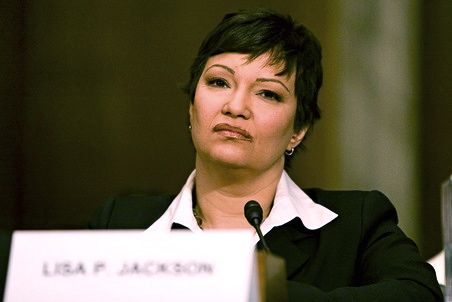
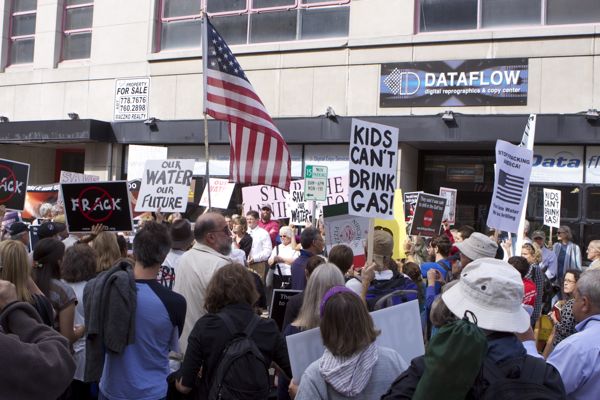
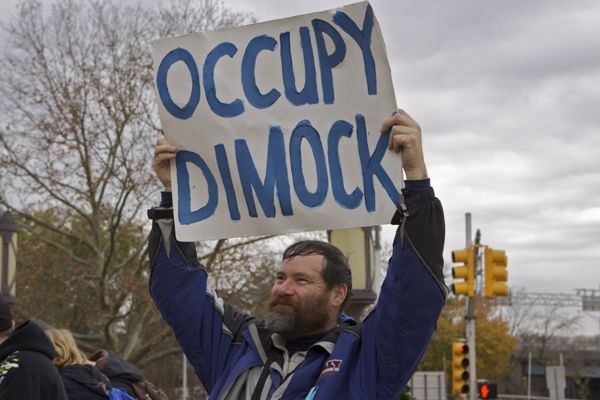
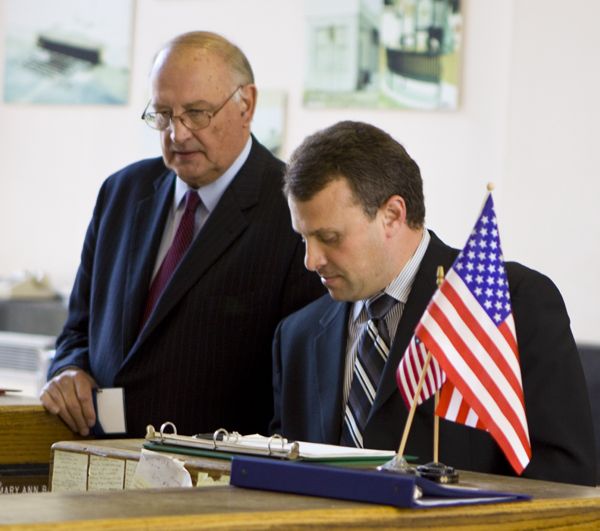
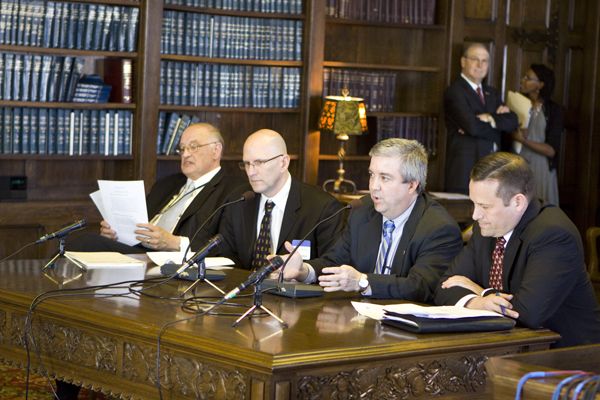
Pingback: CBD oils UK
Pingback: WolfeNotes.com » Corporate Members Of Murphy DEP Science Advisory Board Must Be Replaced
Pingback: DANH MỤC Thời trang Nước hoa - Mỹ phẩm Điện thoại - Sim số Máy tính - Laptop Kỹ thuật số Điện máy Nhà đất - Bất động sản Xây dựng - Nội thất Xe máy - Xe đạp - Ôtô Ẩm thực Cây cảnh - Thủy sinh
Pingback: toko dekorasik
Pingback: https://dekorasik.co
Pingback: beachboundtrailers.com
Pingback: 逸萬門
Pingback: 카지노사이트 순위
Pingback: Click This Link